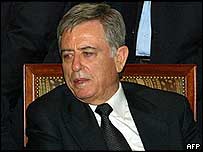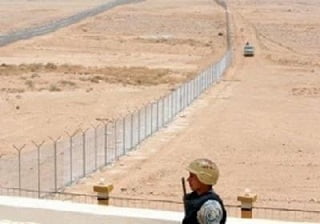Former Syrian Vice President Abdel Halim Khaddam currently engages in occasional statements regarding the impact of the Syrian crisis. Recently, he sent a “final message” to the Alawite community, expressing his belief in the imminent downfall of President Bashar al-Assad and his tyrannical rule. Khaddam urges the community to save what they can and avoid being complicit in the violence, destruction, and looting taking place in the country. He emphasizes that if the Alawite sect remains silent, they will be associated with the oppressive regime and face grave consequences.
According to Khaddam, the Alawite community has not taken a clear position, and the Syrian president has successfully dragged them into the war against the Syrian people. He highlights a limited opportunity for the community to disassociate themselves from the regime, urging them to encourage their sons in the armed forces to rebel against the regime and join the revolution. This, he believes, will help stop the bloodshed, hold Bashar al-Assad accountable, and contribute to the restoration of national unity that has been dismantled by the regime.
Additionally, as a reminder, I would like to mention some moments and memories related to the Syrian politician born in 1932 in Baniyas. These details emerged days after his retirement from political work due to a disagreement with Syrian President Bashar al-Assad. It is worth noting that Khaddam played a significant role in supporting Bashar’s ascent to the presidency following the passing of his father, Hafez al-Assad, in 1999.
This is what I wrote…
That day was an abomination. Crowds filled the offices of the Arab League, and foreign ministers scrambled to rush to the airport and return to their countries. The meetings abruptly adjourned minutes after the news of the earthquake from Riyadh, where King Faisal bin Abdulaziz was shot dead by his nephew. Among the ministers who quickly clarified their reactions to this significant Arab event was Abdel Halim Khaddam. Prior to that, I had spoken to Abdelaziz Bouteflika, the Minister of Foreign Affairs of Algeria (current president), Ahmed Khalifa Al-Suwaidi, the Minister of Foreign Affairs of the United Arab Emirates, and the late Secretary-General of the Arab League, Mahmoud Riad, who gave his reaction in just two words. The situation eventually calmed down, except for my father’s servants who were hesitant. While gasping for breath, my father turned to me and said, “Well, don’t speak. Let others do the talking.” I replied, “Who told you I’m speaking while walking?” I assured him that I was being respectful, and he should go ahead and sit down. However, he chose not to sit, and Khaddam remained silent.
That incident took place in 1975. In the following year and the subsequent years, I encountered the Dean of Syrian Diplomacy repeatedly, whether in Amman or Damascus. The two capitals began what was then referred to as coordination and integration, aiming for unity along the path that Damascus Al-Baath aspired to—the “return of the Jordanian branch to its Syrian origin.” However, Hashemite Amman rejected this idea, and only coordination and integration of positions were pursued at various levels. As expected, this coordination eventually collapsed, like any other joint Arab action.
Quiet and rude…
Whenever we, the choir of journalists, encountered Khaddam, he would speak softly but rudely, often accusing one party or another. He didn’t hesitate to point fingers at journalists themselves, blaming them for their lack of information. This held true for Abu Jamal, as well as many colleagues in the profession or those in charge of it. They would engage in battles of questions and answers without realizing that information is power. Consequently, they would attend press conferences or cover major events without the slightest degree of preparation or knowledge. This lack of preparation made them vulnerable as innocent victims in the presence of brilliant ministers like Khaddam or other astute diplomats.
However, my experience with Abdel Halim Khaddam was quite different. It wasn’t a mere allegation, but rather a personal encounter. In the spring of 1976, his shuttle diplomacy between capitals intensified. The Lebanon file, which was entrusted to him, was a heated one. One evening, while waiting in the hall of the Jordanian Prime Minister’s House alongside fellow reporters from Jordanian newspapers, we anxiously awaited the end of the Cabinet session, hoping to receive news or information to be published in our newspapers before they went to print .
Khaddam has arrived!
Amidst a security crisis and political turmoil, Khaddam suddenly appeared and ascended to the second floor, paying no attention to our scramble towards him. That’s where the office of Jordanian Prime Minister Zaid Al-Rifai, who also served as Minister of Foreign Affairs and Defense, was located. As the Cabinet session concluded without providing us with any information, news came rushing in about Khaddam’s unexpected arrival. What surprised us even more was that just minutes later, the late King Hussein bin Talal of Jordan arrived, accompanied by his late chief of staff, Abdel Hamid Sharaf. The two men joined the meeting on the second floor.
After the meeting, Abdel Hamid Sharaf approached me privately and asked if I would inquire with Abu Jamal about the secret behind Jordan’s absence from the Riyadh conference. This conference had been urgently convened by the Kingdom of Saudi Arabia to discuss the developments in Lebanon, particularly the deployment of Syrian deterrent forces. When Khaddam and Al-Rifai descended from the second floor, I waited for a moment to bid farewell to the king. Al-Rifai and Sharaf were standing nearby. Little did I know that asking a question would provoke such a negative reaction, as if I had committed a punishable crime. Khaddam responded angrily, saying, “Listen?” I replied, “Yes.” He added, “Do you know how to ask?!” Before I could finish my sentence, he turned to Al-Rifai and Sharaf, continuing his conversation about me and criticizing the state of Arab media. He expressed his frustration, stating, “Our Arab media situation is strange. We are always defeated!” Although I didn’t get to fully ask my question to Khaddam, I responded, “Mr. Minister, I don’t believe my question was inappropriate. You had a meeting in Riyadh and now you’re visiting Amman. Is there any specific reason? In any case, I retract my question, but you seem to be implying that the media is the cause of defeats. I assume you’re referring only to informing Syria.” Naturally, my response didn’t go unnoticed, and the next day I faced stern reprimands from Prime Minister Al-Rifai and the late Abdul Hamid Sharaf, who used to ask me questions.
Years passed, and it was now 1980. I found myself in Abu Dhabi, serving as the director of the office of the Eastern newspaper Al-Khaleej, as I had embarked on a life of exile and isolation. One day, the Syrian ambassador in the UAE’s capital invited me for a cup of tea at his residence. He informed me that an influential figure I would meet had arrived in haste that day. I gathered my papers and had a thousand questions in mind. It turned out that a terrorist operation to hijack a plane had been foiled, and two individuals, reportedly members of the Syrian intelligence services, were arrested.
A third confrontation emerges.
Once again, I find myself face-to-face with Khaddam, that elusive figure. We, five journalists, surrounded him, accompanied by the ambassador and some embassy officers. As we moved from one question to another, it eventually became my turn. I asked Khaddam a retaliatory question, not forgetting his response to my query back in 1976. It is said that the Bedouin seeks revenge, and here I am, forty years later, seeking to avenge my father. He replied, “I did it, but I acted hastily.” Today is the day of my revenge, after four long years.
I had a peculiar sense that Minister Khaddam, whose answers were once known to be fierce, is no longer the same. He is now on a mission to secure the release of detained Syrians. It was my moment to inquire. I addressed him, saying, “Sir, after your extensive explanation of the challenges of Arab diplomatic work, don’t you think this work itself is the cause of our defeats, rather than the media?” Furthermore, I asked, “Did you discuss everything except your secret visit to the Emirates?” This time, Abu Jamal appeared calm, with a slight smile. He gestured for me to sit beside him. I obliged, and the ambassador vacated the adjacent seat. I found myself sitting next to the Dean and Activist of Syrian Diplomacy, the Godfather of Lebanon. It was quite an experience.
Amidst everyone’s presence, Khaddam, in his Syrian dialect, asked me if I could recall his name. I replied, “My name is Nasr.” Majali responded, “I remember you.” I added, “Likewise, sir.” He then remarked, “I meant, our lands extend from southern Syria.” I nodded, following Jordanian custom rather than Baathist customs. His laughter filled the air, and he expressed, “I would have loved to answer your question, but unfortunately, there is nothing more I can disclose. Arab diplomacy is truly defeated.”
Today, Abdel Halim Khaddam bids farewell to his diplomatic and political career. Khaddam was undeniably a shining star. He possessed the qualities of adaptability and fierceness. He embodied moderation and realism. While many men stumbled along the way, their papers burnt by the flames of initial defeat, Khaddam remained undefeated.
Abu Jamal, known for his disdain towards the press, never confronted anyone. Whether during Arab summit meetings or similar gatherings at lower levels, he merely expressed his frustration with journalists. Mr. Ghassan Tueni, the esteemed Dean of Al-Nahar newspaper, mentioned that Abu Jamal even challenged him to publish his memoirs.
I already anticipate that our dear uncle Abu Jamal will not acknowledge me, as I did today, in three different instances. He might recall everything but this particular instance. After all, isn’t he known for his constant clashes with the press? How could he mention it? However, we eagerly await the plans and publications of his pen. We hope that his forthcoming work will take us on a historic and captivating journey through this pivotal phase in Arab history, encompassing numerous stages, events, and developments that have only trickled through to the press. How much more is there?
Concluding my article at that time, I remarked, “With hopeful anticipation, we extend our congratulations to Abu Jamal on his decision to retire and make way for the rising generations. It is a bold choice during this significant chapter in Syria’s history. Just as Tariq Aziz received advice from Saddam Hussein and evaded countless tragedies in Iraq, we say to Abu Jamal: Congratulations and may your retirement be fulfilling.”


